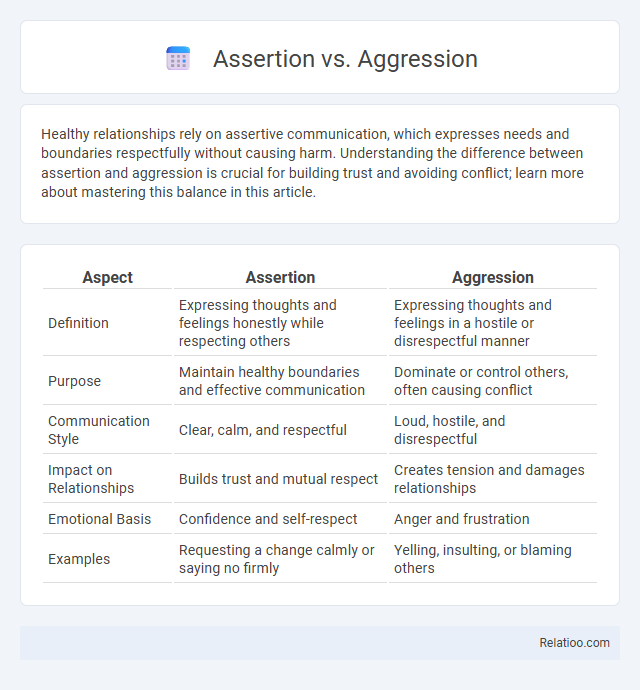Healthy relationships rely on assertive communication, which expresses needs and boundaries respectfully without causing harm. Understanding the difference between assertion and aggression is crucial for building trust and avoiding conflict; learn more about mastering this balance in this article.
Table of Comparison
| Aspect | Assertion | Aggression |
|---|---|---|
| Definition | Expressing thoughts and feelings honestly while respecting others | Expressing thoughts and feelings in a hostile or disrespectful manner |
| Purpose | Maintain healthy boundaries and effective communication | Dominate or control others, often causing conflict |
| Communication Style | Clear, calm, and respectful | Loud, hostile, and disrespectful |
| Impact on Relationships | Builds trust and mutual respect | Creates tension and damages relationships |
| Emotional Basis | Confidence and self-respect | Anger and frustration |
| Examples | Requesting a change calmly or saying no firmly | Yelling, insulting, or blaming others |
Understanding Assertion and Aggression
Understanding assertion involves expressing one's thoughts and feelings confidently and respectfully without violating others' rights, fostering clear and honest communication. Aggression, in contrast, entails hostile or forceful behavior that can infringe on others' rights, often leading to conflict and damaged relationships. Recognizing the difference between assertion and aggression is crucial for effective interpersonal interactions and maintaining positive social dynamics.
Key Differences Between Assertion and Aggression
Assertion involves confidently expressing one's thoughts and needs while respecting others' rights, promoting clear and effective communication. Aggression disregards others' feelings and rights, often manifesting as hostile or forceful behavior aimed at dominating or harming. The key difference lies in respect and intent: assertion seeks mutual understanding, whereas aggression seeks control or harm.
Characteristics of Assertive Behavior
Assertive behavior is characterized by clear, honest, and respectful communication that expresses Your feelings and needs without violating others' rights. Unlike aggression, which involves hostile or dominating actions, assertiveness maintains a balance between confidence and empathy, promoting mutual understanding. Key traits include maintaining eye contact, using a calm tone, and setting boundaries firmly yet politely.
Signs and Impact of Aggressive Behavior
Aggressive behavior is often marked by signs such as raised voices, hostile body language, and the intent to dominate or intimidate others, which can severely disrupt communication and relationships. Unlike assertiveness, which respects personal boundaries and fosters mutual understanding, aggression harms emotional well-being and creates environments of fear or resentment. Recognizing your own aggressive tendencies early can help you adopt healthier interaction styles and improve both personal and professional relationships.
The Psychology Behind Assertion
The psychology behind assertion reveals it as a balanced expression of your thoughts and feelings, promoting confidence and respect without violating others' rights. Unlike aggression, which involves hostile or forceful behavior that can damage relationships, assertion fosters open communication and self-empowerment. Understanding these distinctions helps improve interpersonal skills and emotional intelligence, enhancing your ability to navigate social interactions effectively.
Consequences of Aggression in Communication
Aggression in communication often leads to damaged relationships, increased conflict, and a breakdown in trust between parties. Unlike assertion, which promotes clear and respectful expression of needs, aggression can result in feelings of fear, resentment, or defensiveness in others. Persistent aggressive behavior may create a hostile environment, reducing cooperation and impeding effective problem-solving.
Benefits of Being Assertive
Being assertive allows you to express your thoughts and feelings clearly while respecting others' rights, leading to healthier communication and stronger relationships. Unlike aggression, which can create conflict, assertiveness promotes mutual understanding and problem-solving. Developing assertive skills boosts self-confidence and reduces stress by enabling you to set boundaries effectively.
Common Myths About Assertion and Aggression
Common myths about assertion and aggression often confuse assertiveness with hostility, leading many to avoid standing up for themselves. You can be assertive without being aggressive by expressing your needs and boundaries respectfully and clearly. Understanding this distinction empowers you to communicate effectively without damaging relationships.
Strategies to Develop Assertiveness Skills
Developing assertiveness skills involves practicing clear communication and setting boundaries without hostility or passivity. Strategies include using "I" statements to express feelings and needs confidently, rehearsing responses in challenging scenarios, and recognizing the difference between assertive behavior and aggression to maintain respectful interactions. Building self-awareness and empathy enhances the ability to assert oneself effectively while fostering positive relationships in personal and professional settings.
Choosing Assertion Over Aggression for Healthy Relationships
Choosing assertion over aggression fosters clear communication and mutual respect, essential for healthy relationships. Assertion involves expressing thoughts and feelings confidently without violating others' rights, while aggression often leads to conflict and emotional harm. Prioritizing assertion helps resolve disagreements constructively, strengthening trust and understanding between individuals.

Infographic: Assertion vs Aggression
 relatioo.com
relatioo.com